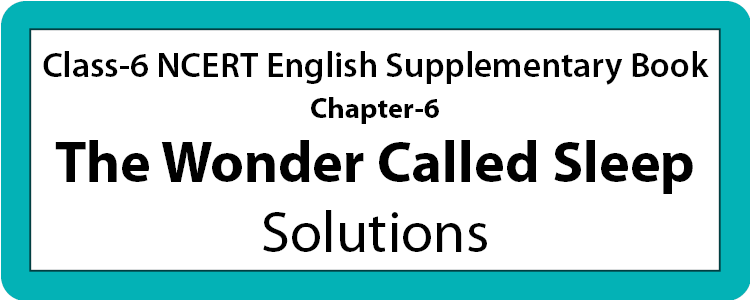A Pact with the Sun Class 6 Chapter 6: The Wonder Called Sleep Summary
Summary of Chapter 6: The Wonder Called Sleep Solutions / Questions and Answers
Chapter summary:
The Wonder Called Sleep Solutions Summary:
The chapter “The Wonder Called Sleep” explores the nature and benefits of sleep. Sleep is described as a state of unconscious rest that allows our body and mind to recover from the fatigue of daily activities. During sleep, our muscles relax, heartbeat slows down, and body temperature and blood pressure decrease. The brain, although less active, continues to work by creating dreams.
Dreams are activities of the mind that occur during sleep. They can be realistic or fantastical, and they often help us sleep through disturbances like noise. While dreams may reveal insights into our problems, they cannot predict the future.
The chapter emphasises the importance of sleep for physical and mental rejuvenation and highlights its mysterious and wondrous nature. It concludes with a poetic excerpt by Edward Thomas that reflects on the experience of falling asleep.
NCERT Solutions for A Pact with the Sun Class 6 The Wonder Called Sleep Solutions
Chapter 6: The Wonder Called Sleep Solutions / Questions and Answers
Question 1: What is the most obvious advantage of sleep?
Answer: The most obvious advantage of sleep is that it allows our body and mind to recover from the fatigue caused by the day’s activities, making us alert and active again.
Question 2: What happens to our body when we sleep?
Answer: When we sleep, several things happen to our body: our muscles relax, our heartbeat becomes slower, our body temperature and blood pressure decrease, and our brain activity slows down.
Question 3: Define a dream in your own words.
Answer: A dream is a sequence of thoughts, images, or sensations that occur in the mind during sleep.
Question 4: Why are dreams important? Mention two reasons.
Answer: Dreams are important because they help us sleep through noise and other disturbances, and they may reveal insights about our personal problems.
Question 5: Why has sleep been called a wonder?
Answer:Sleep has been called a wonder because it is a common yet mysterious experience that significantly impacts our physical and mental well-being
Question 6: Describe briefly to the class an improbable dream you have ever had.
Answer: [This answer will vary based on individual experiences. Encourage students to share a unique and imaginative dream.]

The Wonder Called Sleep solutions – A Pact with the Sun Summary, Questions, and Answers
Extra Practice Questions with Answers related to Chapter-6 Solutions
Question 1: What changes occur in the body when? we wake up from sleep.
Answer: When we wake up, our body temperature and blood pressure return to normal, our heartbeat and breathing rate increase to normal levels, and we become fully awake and alert.
Question 2: How do dreams help us sleep through disturbances?
Answer: Dreams help us sleep through disturbances by creating scenarios that incorporate the disturbances into the dream. For example, if an alarm clock rings, the mind might create a dream where the sound is a telephone or doorbell ringing, allowing us to continue sleeping.
Question 3: What insights can dreams provide according to certain doctors?
Answer: According to certain doctors, dreams can reveal a great deal about a person’s problems and, if understood correctly, can provide a key to solving those problems.
Question 4: Why can dreams never be used to predict the future?
Answer: Dreams can never be used to predict the future because they are merely a reflection of our subconscious mind and do not have any actual foresight into future events.
Question 5: What poetic devices are used in Edward Thomas’s poem “Lights Out” to describe sleep?
Answer: In “Lights Out,” Edward Thomas uses metaphors (e.g., “the borders of sleep” and “the unfathomable deep”), imagery (e.g., “Forest where all must lose their way”), and personification (e.g., describing sleep as an “unknown” that one must “enter and leave alone”) to evoke the mysterious and solitary nature of falling asleep.